Confidentiality Breaches: Social Media Use in Nursing Practice
VerifiedAdded on 2022/10/01
|9
|2116
|197
Report
AI Summary
This report addresses the ethical principles of nursing, focusing on patient confidentiality and the implications of social media use. It presents a scenario where a graduate RN has posted comments about a patient on Instagram, prompting a discussion on professional responsibility. The report explores the ethical principle of confidentiality, defining it as the right of patients to have their personal health information kept private. It highlights the responsibilities of nurses in maintaining confidentiality, including protecting patient data from unauthorized access and avoiding sharing information on social media. The report reviews relevant literature on social media use by nurses, discussing the risks of breaching patient privacy and the importance of implementing strict policies and guidelines. It references the Health Insurance Portability and Accountability Act (HIPAA) privacy rule and emphasizes the need for de-identification of patient information when using social media. Several strategies are proposed to address inappropriate social media usage, including incorporating policies against leaking confidential data, establishing guidelines to govern social media use, and providing education and training sessions. The report also discusses the application of the ADDIE model to enhance nurses' knowledge of their responsibilities and the use of reflective quizzes to encourage self-reflection. It concludes by emphasizing the legal consequences of confidentiality breaches and the importance of implementing the discussed strategies to ensure compliance with professional standards and protect the reputation of both the nurse and the healthcare organization.
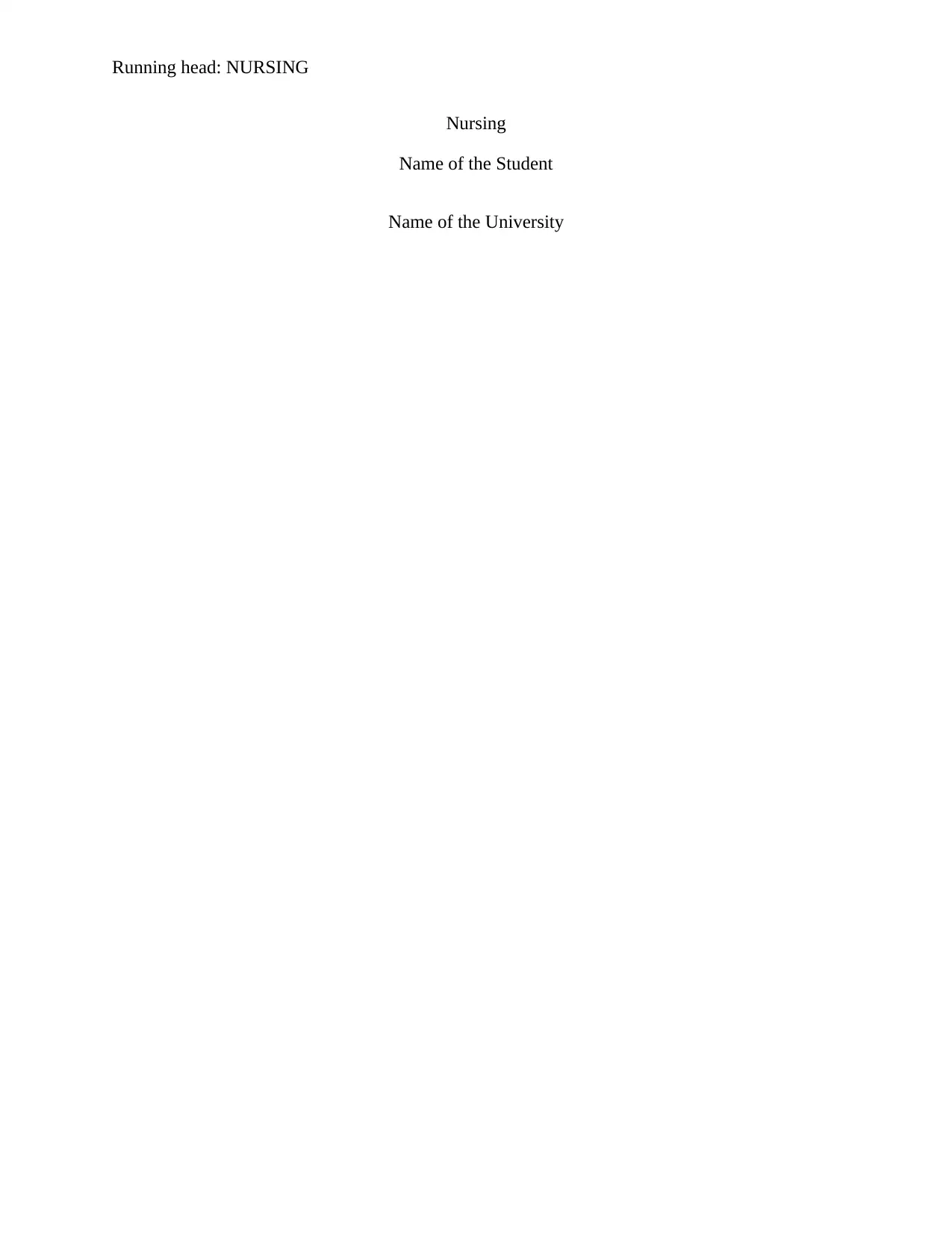
Running head: NURSING
Nursing
Name of the Student
Name of the University
Nursing
Name of the Student
Name of the University
Paraphrase This Document
Need a fresh take? Get an instant paraphrase of this document with our AI Paraphraser
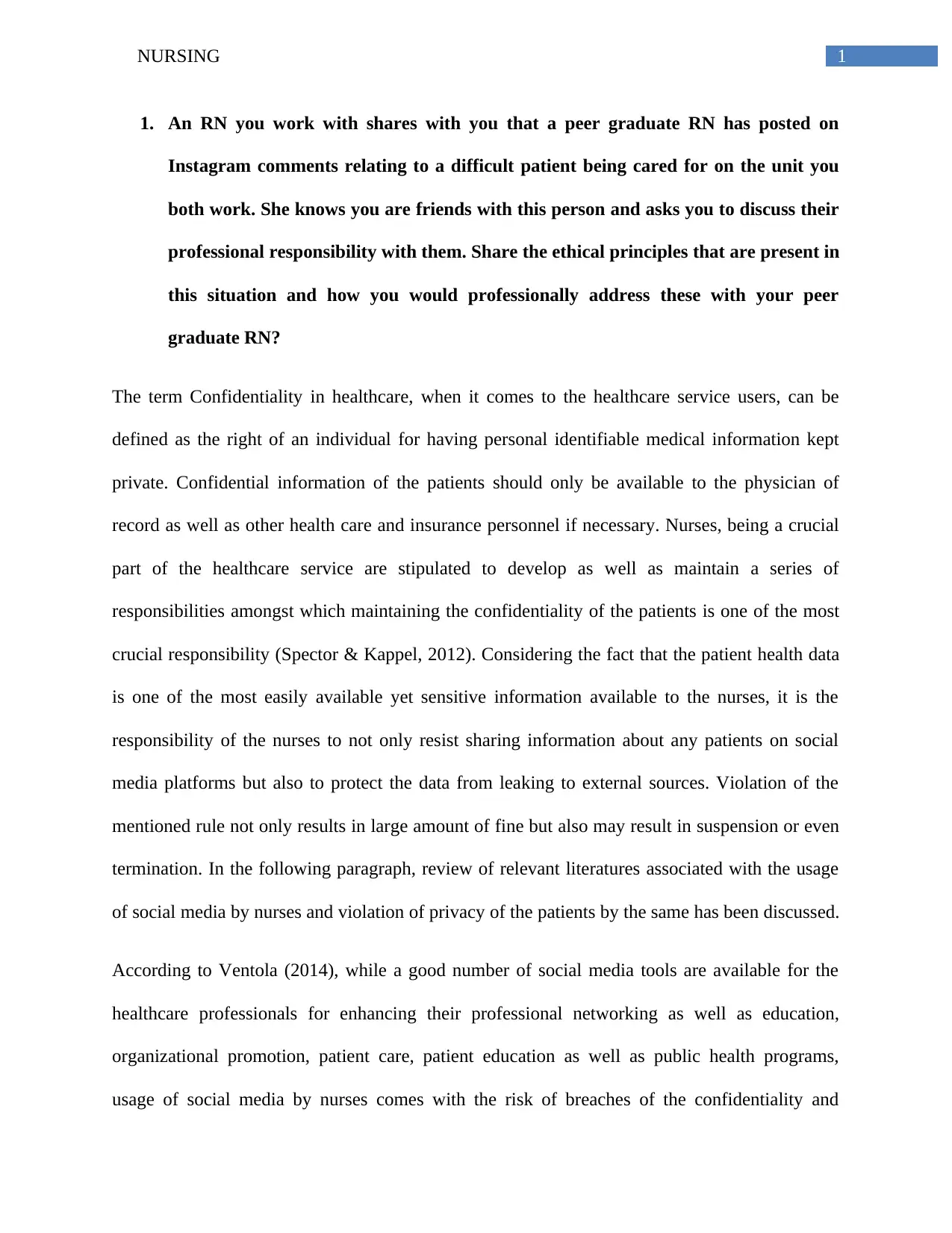
1NURSING
1. An RN you work with shares with you that a peer graduate RN has posted on
Instagram comments relating to a difficult patient being cared for on the unit you
both work. She knows you are friends with this person and asks you to discuss their
professional responsibility with them. Share the ethical principles that are present in
this situation and how you would professionally address these with your peer
graduate RN?
The term Confidentiality in healthcare, when it comes to the healthcare service users, can be
defined as the right of an individual for having personal identifiable medical information kept
private. Confidential information of the patients should only be available to the physician of
record as well as other health care and insurance personnel if necessary. Nurses, being a crucial
part of the healthcare service are stipulated to develop as well as maintain a series of
responsibilities amongst which maintaining the confidentiality of the patients is one of the most
crucial responsibility (Spector & Kappel, 2012). Considering the fact that the patient health data
is one of the most easily available yet sensitive information available to the nurses, it is the
responsibility of the nurses to not only resist sharing information about any patients on social
media platforms but also to protect the data from leaking to external sources. Violation of the
mentioned rule not only results in large amount of fine but also may result in suspension or even
termination. In the following paragraph, review of relevant literatures associated with the usage
of social media by nurses and violation of privacy of the patients by the same has been discussed.
According to Ventola (2014), while a good number of social media tools are available for the
healthcare professionals for enhancing their professional networking as well as education,
organizational promotion, patient care, patient education as well as public health programs,
usage of social media by nurses comes with the risk of breaches of the confidentiality and
1. An RN you work with shares with you that a peer graduate RN has posted on
Instagram comments relating to a difficult patient being cared for on the unit you
both work. She knows you are friends with this person and asks you to discuss their
professional responsibility with them. Share the ethical principles that are present in
this situation and how you would professionally address these with your peer
graduate RN?
The term Confidentiality in healthcare, when it comes to the healthcare service users, can be
defined as the right of an individual for having personal identifiable medical information kept
private. Confidential information of the patients should only be available to the physician of
record as well as other health care and insurance personnel if necessary. Nurses, being a crucial
part of the healthcare service are stipulated to develop as well as maintain a series of
responsibilities amongst which maintaining the confidentiality of the patients is one of the most
crucial responsibility (Spector & Kappel, 2012). Considering the fact that the patient health data
is one of the most easily available yet sensitive information available to the nurses, it is the
responsibility of the nurses to not only resist sharing information about any patients on social
media platforms but also to protect the data from leaking to external sources. Violation of the
mentioned rule not only results in large amount of fine but also may result in suspension or even
termination. In the following paragraph, review of relevant literatures associated with the usage
of social media by nurses and violation of privacy of the patients by the same has been discussed.
According to Ventola (2014), while a good number of social media tools are available for the
healthcare professionals for enhancing their professional networking as well as education,
organizational promotion, patient care, patient education as well as public health programs,
usage of social media by nurses comes with the risk of breaches of the confidentiality and
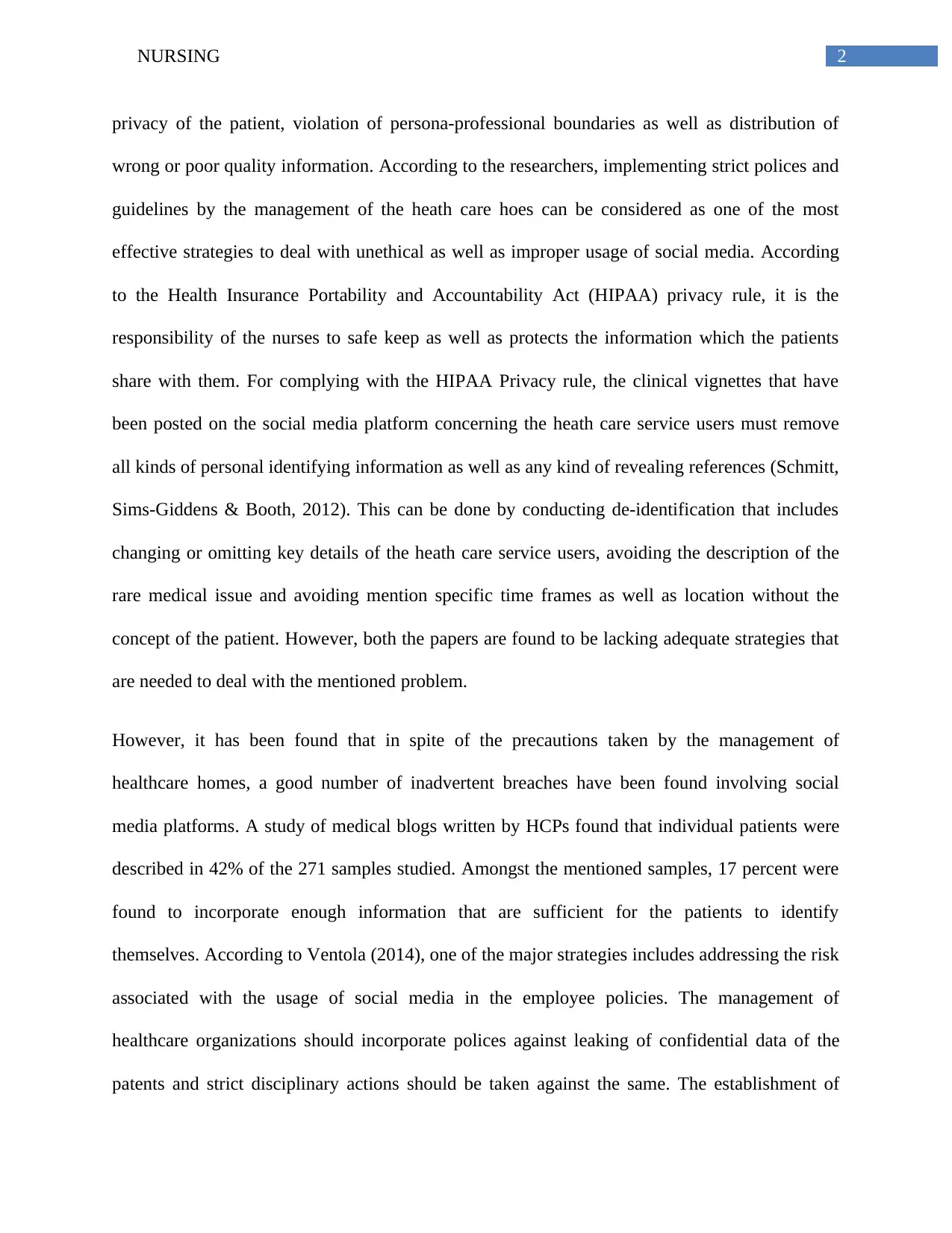
2NURSING
privacy of the patient, violation of persona-professional boundaries as well as distribution of
wrong or poor quality information. According to the researchers, implementing strict polices and
guidelines by the management of the heath care hoes can be considered as one of the most
effective strategies to deal with unethical as well as improper usage of social media. According
to the Health Insurance Portability and Accountability Act (HIPAA) privacy rule, it is the
responsibility of the nurses to safe keep as well as protects the information which the patients
share with them. For complying with the HIPAA Privacy rule, the clinical vignettes that have
been posted on the social media platform concerning the heath care service users must remove
all kinds of personal identifying information as well as any kind of revealing references (Schmitt,
Sims-Giddens & Booth, 2012). This can be done by conducting de-identification that includes
changing or omitting key details of the heath care service users, avoiding the description of the
rare medical issue and avoiding mention specific time frames as well as location without the
concept of the patient. However, both the papers are found to be lacking adequate strategies that
are needed to deal with the mentioned problem.
However, it has been found that in spite of the precautions taken by the management of
healthcare homes, a good number of inadvertent breaches have been found involving social
media platforms. A study of medical blogs written by HCPs found that individual patients were
described in 42% of the 271 samples studied. Amongst the mentioned samples, 17 percent were
found to incorporate enough information that are sufficient for the patients to identify
themselves. According to Ventola (2014), one of the major strategies includes addressing the risk
associated with the usage of social media in the employee policies. The management of
healthcare organizations should incorporate polices against leaking of confidential data of the
patents and strict disciplinary actions should be taken against the same. The establishment of
privacy of the patient, violation of persona-professional boundaries as well as distribution of
wrong or poor quality information. According to the researchers, implementing strict polices and
guidelines by the management of the heath care hoes can be considered as one of the most
effective strategies to deal with unethical as well as improper usage of social media. According
to the Health Insurance Portability and Accountability Act (HIPAA) privacy rule, it is the
responsibility of the nurses to safe keep as well as protects the information which the patients
share with them. For complying with the HIPAA Privacy rule, the clinical vignettes that have
been posted on the social media platform concerning the heath care service users must remove
all kinds of personal identifying information as well as any kind of revealing references (Schmitt,
Sims-Giddens & Booth, 2012). This can be done by conducting de-identification that includes
changing or omitting key details of the heath care service users, avoiding the description of the
rare medical issue and avoiding mention specific time frames as well as location without the
concept of the patient. However, both the papers are found to be lacking adequate strategies that
are needed to deal with the mentioned problem.
However, it has been found that in spite of the precautions taken by the management of
healthcare homes, a good number of inadvertent breaches have been found involving social
media platforms. A study of medical blogs written by HCPs found that individual patients were
described in 42% of the 271 samples studied. Amongst the mentioned samples, 17 percent were
found to incorporate enough information that are sufficient for the patients to identify
themselves. According to Ventola (2014), one of the major strategies includes addressing the risk
associated with the usage of social media in the employee policies. The management of
healthcare organizations should incorporate polices against leaking of confidential data of the
patents and strict disciplinary actions should be taken against the same. The establishment of
⊘ This is a preview!⊘
Do you want full access?
Subscribe today to unlock all pages.

Trusted by 1+ million students worldwide
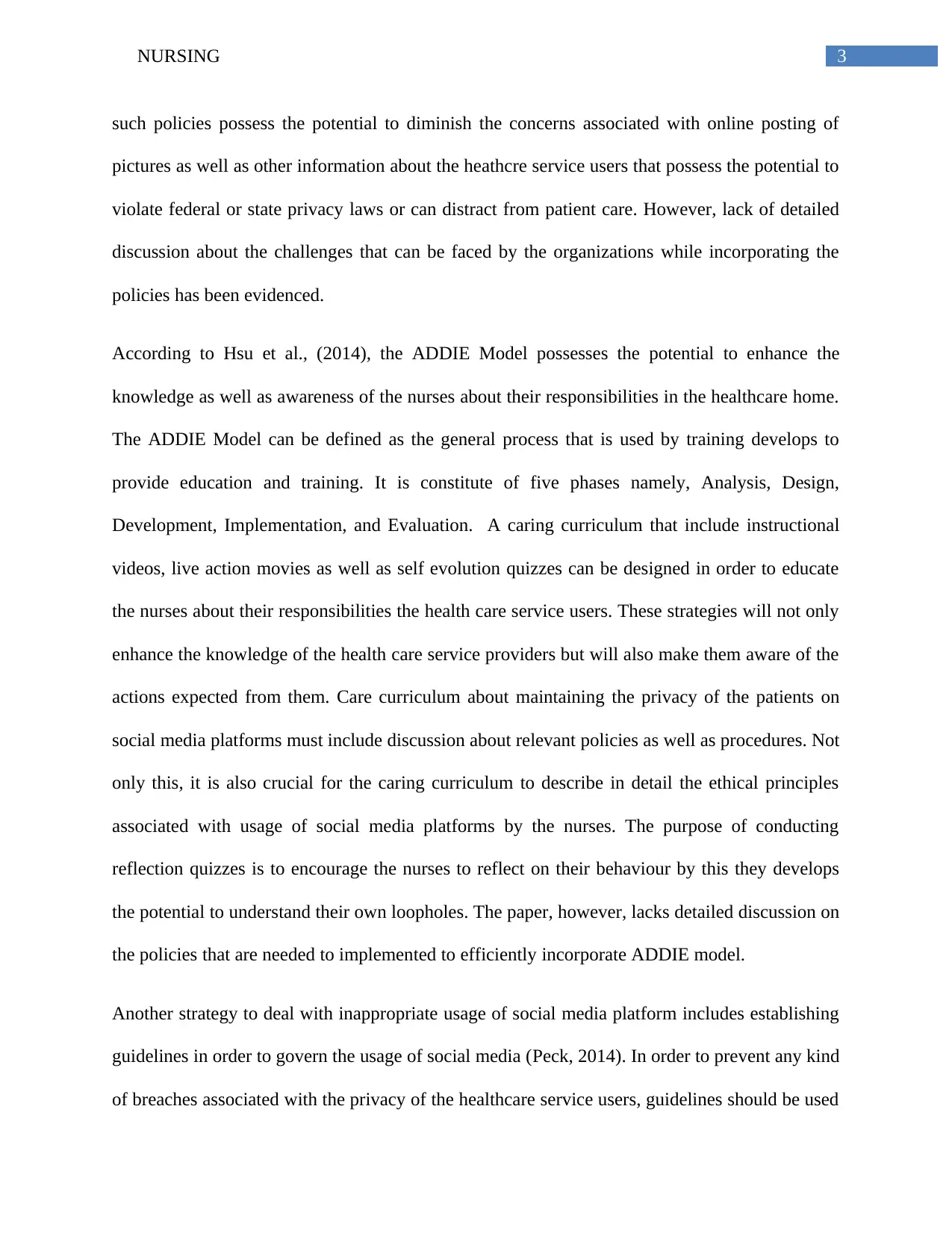
3NURSING
such policies possess the potential to diminish the concerns associated with online posting of
pictures as well as other information about the heathcre service users that possess the potential to
violate federal or state privacy laws or can distract from patient care. However, lack of detailed
discussion about the challenges that can be faced by the organizations while incorporating the
policies has been evidenced.
According to Hsu et al., (2014), the ADDIE Model possesses the potential to enhance the
knowledge as well as awareness of the nurses about their responsibilities in the healthcare home.
The ADDIE Model can be defined as the general process that is used by training develops to
provide education and training. It is constitute of five phases namely, Analysis, Design,
Development, Implementation, and Evaluation. A caring curriculum that include instructional
videos, live action movies as well as self evolution quizzes can be designed in order to educate
the nurses about their responsibilities the health care service users. These strategies will not only
enhance the knowledge of the health care service providers but will also make them aware of the
actions expected from them. Care curriculum about maintaining the privacy of the patients on
social media platforms must include discussion about relevant policies as well as procedures. Not
only this, it is also crucial for the caring curriculum to describe in detail the ethical principles
associated with usage of social media platforms by the nurses. The purpose of conducting
reflection quizzes is to encourage the nurses to reflect on their behaviour by this they develops
the potential to understand their own loopholes. The paper, however, lacks detailed discussion on
the policies that are needed to implemented to efficiently incorporate ADDIE model.
Another strategy to deal with inappropriate usage of social media platform includes establishing
guidelines in order to govern the usage of social media (Peck, 2014). In order to prevent any kind
of breaches associated with the privacy of the healthcare service users, guidelines should be used
such policies possess the potential to diminish the concerns associated with online posting of
pictures as well as other information about the heathcre service users that possess the potential to
violate federal or state privacy laws or can distract from patient care. However, lack of detailed
discussion about the challenges that can be faced by the organizations while incorporating the
policies has been evidenced.
According to Hsu et al., (2014), the ADDIE Model possesses the potential to enhance the
knowledge as well as awareness of the nurses about their responsibilities in the healthcare home.
The ADDIE Model can be defined as the general process that is used by training develops to
provide education and training. It is constitute of five phases namely, Analysis, Design,
Development, Implementation, and Evaluation. A caring curriculum that include instructional
videos, live action movies as well as self evolution quizzes can be designed in order to educate
the nurses about their responsibilities the health care service users. These strategies will not only
enhance the knowledge of the health care service providers but will also make them aware of the
actions expected from them. Care curriculum about maintaining the privacy of the patients on
social media platforms must include discussion about relevant policies as well as procedures. Not
only this, it is also crucial for the caring curriculum to describe in detail the ethical principles
associated with usage of social media platforms by the nurses. The purpose of conducting
reflection quizzes is to encourage the nurses to reflect on their behaviour by this they develops
the potential to understand their own loopholes. The paper, however, lacks detailed discussion on
the policies that are needed to implemented to efficiently incorporate ADDIE model.
Another strategy to deal with inappropriate usage of social media platform includes establishing
guidelines in order to govern the usage of social media (Peck, 2014). In order to prevent any kind
of breaches associated with the privacy of the healthcare service users, guidelines should be used
Paraphrase This Document
Need a fresh take? Get an instant paraphrase of this document with our AI Paraphraser
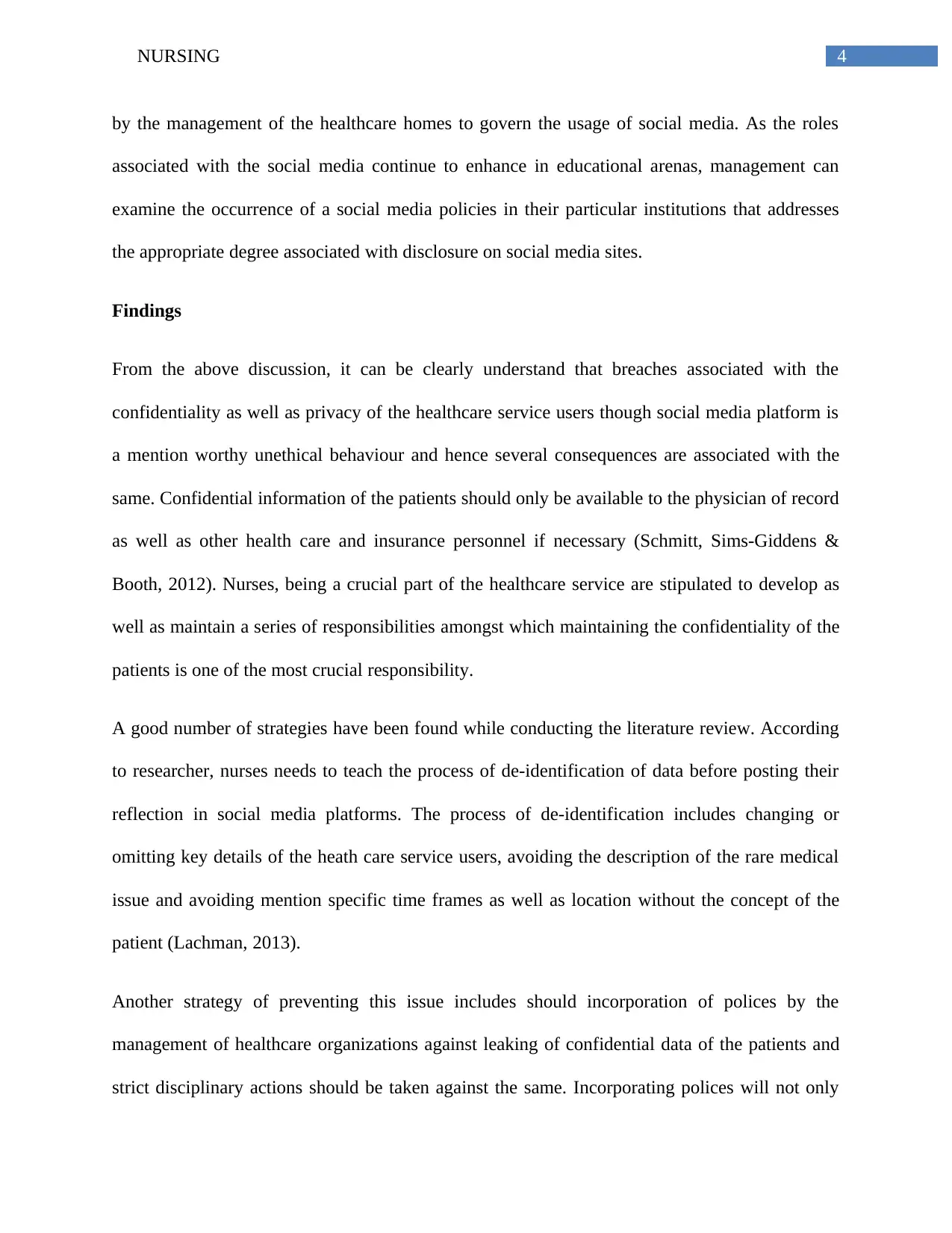
4NURSING
by the management of the healthcare homes to govern the usage of social media. As the roles
associated with the social media continue to enhance in educational arenas, management can
examine the occurrence of a social media policies in their particular institutions that addresses
the appropriate degree associated with disclosure on social media sites.
Findings
From the above discussion, it can be clearly understand that breaches associated with the
confidentiality as well as privacy of the healthcare service users though social media platform is
a mention worthy unethical behaviour and hence several consequences are associated with the
same. Confidential information of the patients should only be available to the physician of record
as well as other health care and insurance personnel if necessary (Schmitt, Sims-Giddens &
Booth, 2012). Nurses, being a crucial part of the healthcare service are stipulated to develop as
well as maintain a series of responsibilities amongst which maintaining the confidentiality of the
patients is one of the most crucial responsibility.
A good number of strategies have been found while conducting the literature review. According
to researcher, nurses needs to teach the process of de-identification of data before posting their
reflection in social media platforms. The process of de-identification includes changing or
omitting key details of the heath care service users, avoiding the description of the rare medical
issue and avoiding mention specific time frames as well as location without the concept of the
patient (Lachman, 2013).
Another strategy of preventing this issue includes should incorporation of polices by the
management of healthcare organizations against leaking of confidential data of the patients and
strict disciplinary actions should be taken against the same. Incorporating polices will not only
by the management of the healthcare homes to govern the usage of social media. As the roles
associated with the social media continue to enhance in educational arenas, management can
examine the occurrence of a social media policies in their particular institutions that addresses
the appropriate degree associated with disclosure on social media sites.
Findings
From the above discussion, it can be clearly understand that breaches associated with the
confidentiality as well as privacy of the healthcare service users though social media platform is
a mention worthy unethical behaviour and hence several consequences are associated with the
same. Confidential information of the patients should only be available to the physician of record
as well as other health care and insurance personnel if necessary (Schmitt, Sims-Giddens &
Booth, 2012). Nurses, being a crucial part of the healthcare service are stipulated to develop as
well as maintain a series of responsibilities amongst which maintaining the confidentiality of the
patients is one of the most crucial responsibility.
A good number of strategies have been found while conducting the literature review. According
to researcher, nurses needs to teach the process of de-identification of data before posting their
reflection in social media platforms. The process of de-identification includes changing or
omitting key details of the heath care service users, avoiding the description of the rare medical
issue and avoiding mention specific time frames as well as location without the concept of the
patient (Lachman, 2013).
Another strategy of preventing this issue includes should incorporation of polices by the
management of healthcare organizations against leaking of confidential data of the patients and
strict disciplinary actions should be taken against the same. Incorporating polices will not only
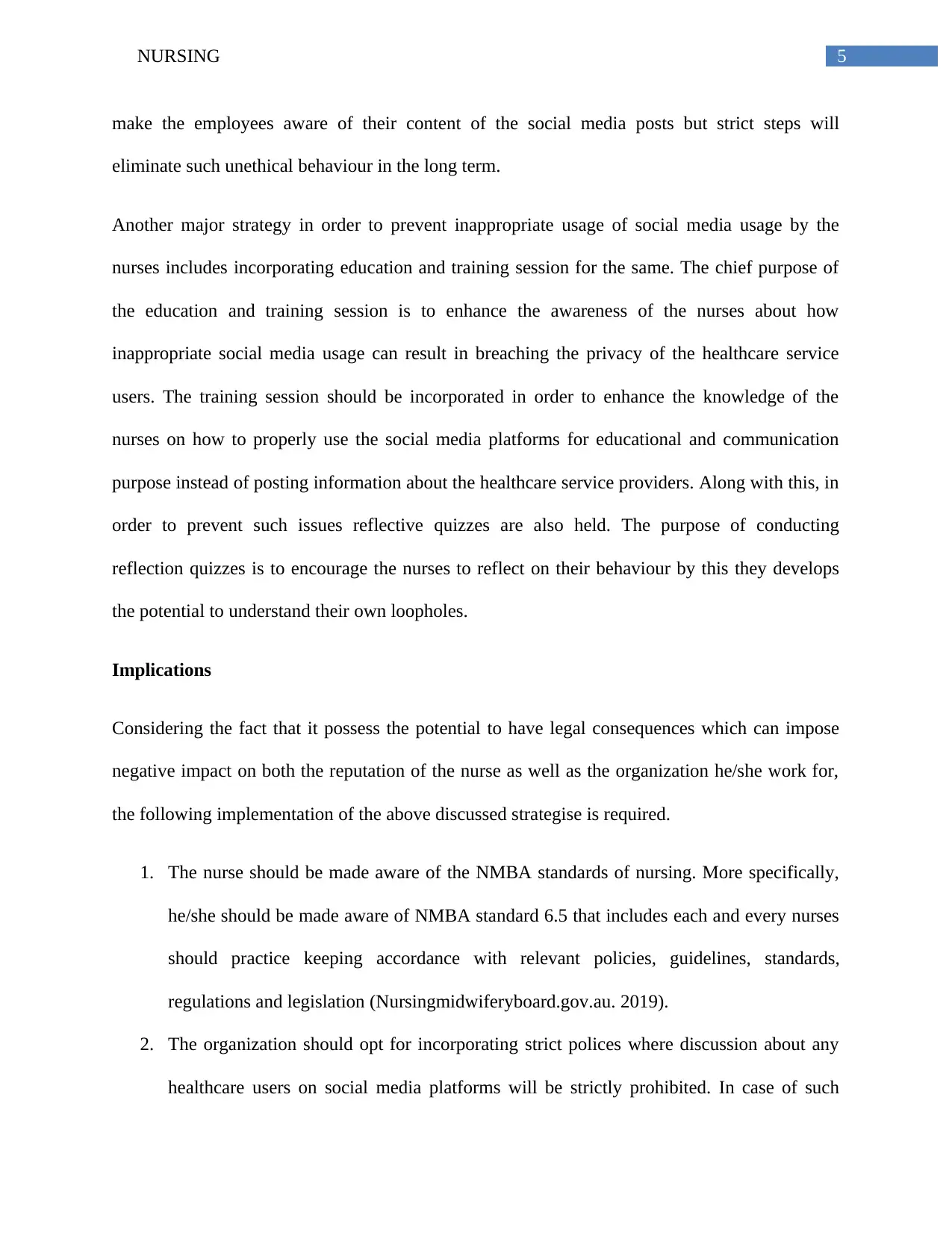
5NURSING
make the employees aware of their content of the social media posts but strict steps will
eliminate such unethical behaviour in the long term.
Another major strategy in order to prevent inappropriate usage of social media usage by the
nurses includes incorporating education and training session for the same. The chief purpose of
the education and training session is to enhance the awareness of the nurses about how
inappropriate social media usage can result in breaching the privacy of the healthcare service
users. The training session should be incorporated in order to enhance the knowledge of the
nurses on how to properly use the social media platforms for educational and communication
purpose instead of posting information about the healthcare service providers. Along with this, in
order to prevent such issues reflective quizzes are also held. The purpose of conducting
reflection quizzes is to encourage the nurses to reflect on their behaviour by this they develops
the potential to understand their own loopholes.
Implications
Considering the fact that it possess the potential to have legal consequences which can impose
negative impact on both the reputation of the nurse as well as the organization he/she work for,
the following implementation of the above discussed strategise is required.
1. The nurse should be made aware of the NMBA standards of nursing. More specifically,
he/she should be made aware of NMBA standard 6.5 that includes each and every nurses
should practice keeping accordance with relevant policies, guidelines, standards,
regulations and legislation (Nursingmidwiferyboard.gov.au. 2019).
2. The organization should opt for incorporating strict polices where discussion about any
healthcare users on social media platforms will be strictly prohibited. In case of such
make the employees aware of their content of the social media posts but strict steps will
eliminate such unethical behaviour in the long term.
Another major strategy in order to prevent inappropriate usage of social media usage by the
nurses includes incorporating education and training session for the same. The chief purpose of
the education and training session is to enhance the awareness of the nurses about how
inappropriate social media usage can result in breaching the privacy of the healthcare service
users. The training session should be incorporated in order to enhance the knowledge of the
nurses on how to properly use the social media platforms for educational and communication
purpose instead of posting information about the healthcare service providers. Along with this, in
order to prevent such issues reflective quizzes are also held. The purpose of conducting
reflection quizzes is to encourage the nurses to reflect on their behaviour by this they develops
the potential to understand their own loopholes.
Implications
Considering the fact that it possess the potential to have legal consequences which can impose
negative impact on both the reputation of the nurse as well as the organization he/she work for,
the following implementation of the above discussed strategise is required.
1. The nurse should be made aware of the NMBA standards of nursing. More specifically,
he/she should be made aware of NMBA standard 6.5 that includes each and every nurses
should practice keeping accordance with relevant policies, guidelines, standards,
regulations and legislation (Nursingmidwiferyboard.gov.au. 2019).
2. The organization should opt for incorporating strict polices where discussion about any
healthcare users on social media platforms will be strictly prohibited. In case of such
⊘ This is a preview!⊘
Do you want full access?
Subscribe today to unlock all pages.

Trusted by 1+ million students worldwide
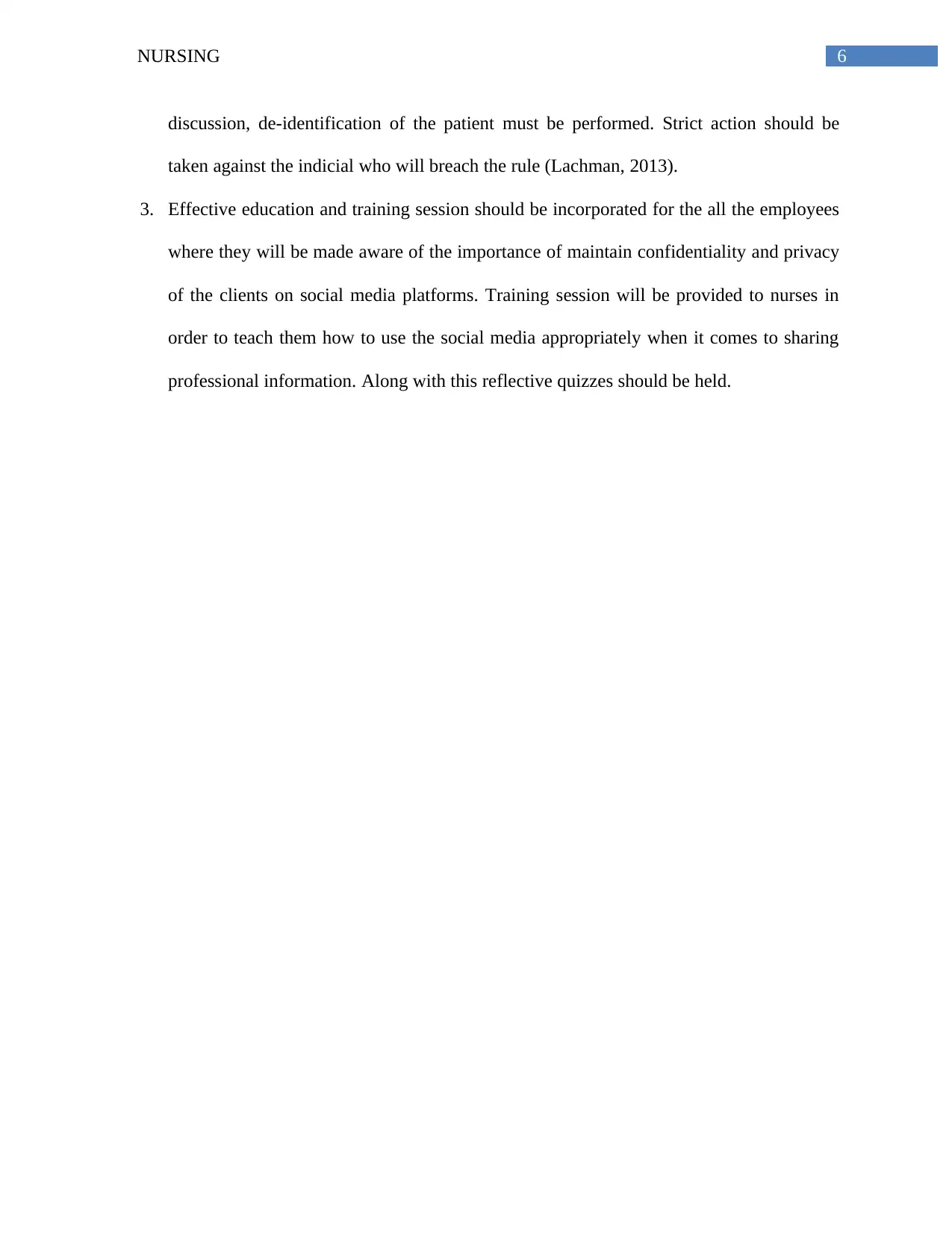
6NURSING
discussion, de-identification of the patient must be performed. Strict action should be
taken against the indicial who will breach the rule (Lachman, 2013).
3. Effective education and training session should be incorporated for the all the employees
where they will be made aware of the importance of maintain confidentiality and privacy
of the clients on social media platforms. Training session will be provided to nurses in
order to teach them how to use the social media appropriately when it comes to sharing
professional information. Along with this reflective quizzes should be held.
discussion, de-identification of the patient must be performed. Strict action should be
taken against the indicial who will breach the rule (Lachman, 2013).
3. Effective education and training session should be incorporated for the all the employees
where they will be made aware of the importance of maintain confidentiality and privacy
of the clients on social media platforms. Training session will be provided to nurses in
order to teach them how to use the social media appropriately when it comes to sharing
professional information. Along with this reflective quizzes should be held.
Paraphrase This Document
Need a fresh take? Get an instant paraphrase of this document with our AI Paraphraser
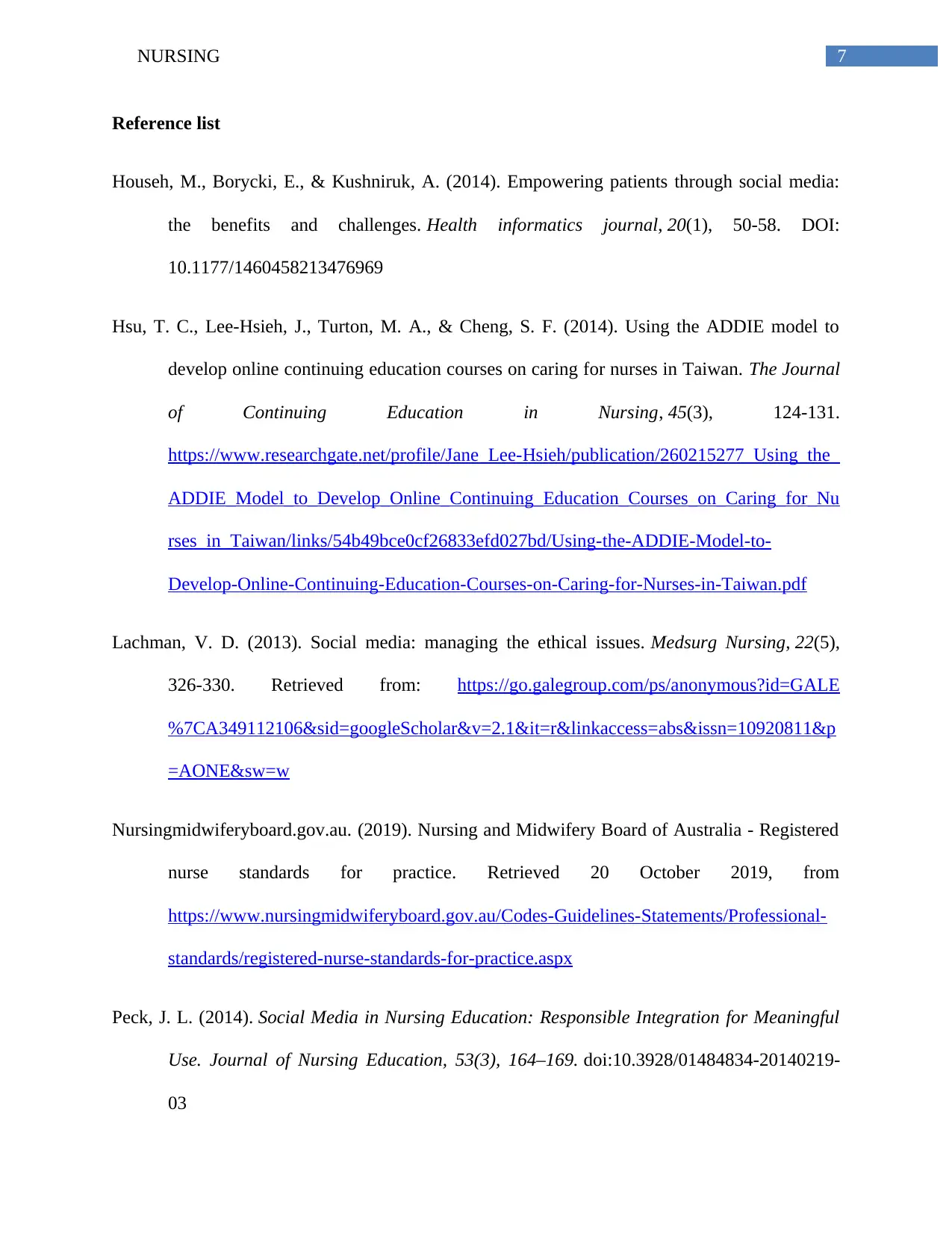
7NURSING
Reference list
Househ, M., Borycki, E., & Kushniruk, A. (2014). Empowering patients through social media:
the benefits and challenges. Health informatics journal, 20(1), 50-58. DOI:
10.1177/1460458213476969
Hsu, T. C., Lee-Hsieh, J., Turton, M. A., & Cheng, S. F. (2014). Using the ADDIE model to
develop online continuing education courses on caring for nurses in Taiwan. The Journal
of Continuing Education in Nursing, 45(3), 124-131.
https://www.researchgate.net/profile/Jane_Lee-Hsieh/publication/260215277_Using_the_
ADDIE_Model_to_Develop_Online_Continuing_Education_Courses_on_Caring_for_Nu
rses_in_Taiwan/links/54b49bce0cf26833efd027bd/Using-the-ADDIE-Model-to-
Develop-Online-Continuing-Education-Courses-on-Caring-for-Nurses-in-Taiwan.pdf
Lachman, V. D. (2013). Social media: managing the ethical issues. Medsurg Nursing, 22(5),
326-330. Retrieved from: https://go.galegroup.com/ps/anonymous?id=GALE
%7CA349112106&sid=googleScholar&v=2.1&it=r&linkaccess=abs&issn=10920811&p
=AONE&sw=w
Nursingmidwiferyboard.gov.au. (2019). Nursing and Midwifery Board of Australia - Registered
nurse standards for practice. Retrieved 20 October 2019, from
https://www.nursingmidwiferyboard.gov.au/Codes-Guidelines-Statements/Professional-
standards/registered-nurse-standards-for-practice.aspx
Peck, J. L. (2014). Social Media in Nursing Education: Responsible Integration for Meaningful
Use. Journal of Nursing Education, 53(3), 164–169. doi:10.3928/01484834-20140219-
03
Reference list
Househ, M., Borycki, E., & Kushniruk, A. (2014). Empowering patients through social media:
the benefits and challenges. Health informatics journal, 20(1), 50-58. DOI:
10.1177/1460458213476969
Hsu, T. C., Lee-Hsieh, J., Turton, M. A., & Cheng, S. F. (2014). Using the ADDIE model to
develop online continuing education courses on caring for nurses in Taiwan. The Journal
of Continuing Education in Nursing, 45(3), 124-131.
https://www.researchgate.net/profile/Jane_Lee-Hsieh/publication/260215277_Using_the_
ADDIE_Model_to_Develop_Online_Continuing_Education_Courses_on_Caring_for_Nu
rses_in_Taiwan/links/54b49bce0cf26833efd027bd/Using-the-ADDIE-Model-to-
Develop-Online-Continuing-Education-Courses-on-Caring-for-Nurses-in-Taiwan.pdf
Lachman, V. D. (2013). Social media: managing the ethical issues. Medsurg Nursing, 22(5),
326-330. Retrieved from: https://go.galegroup.com/ps/anonymous?id=GALE
%7CA349112106&sid=googleScholar&v=2.1&it=r&linkaccess=abs&issn=10920811&p
=AONE&sw=w
Nursingmidwiferyboard.gov.au. (2019). Nursing and Midwifery Board of Australia - Registered
nurse standards for practice. Retrieved 20 October 2019, from
https://www.nursingmidwiferyboard.gov.au/Codes-Guidelines-Statements/Professional-
standards/registered-nurse-standards-for-practice.aspx
Peck, J. L. (2014). Social Media in Nursing Education: Responsible Integration for Meaningful
Use. Journal of Nursing Education, 53(3), 164–169. doi:10.3928/01484834-20140219-
03
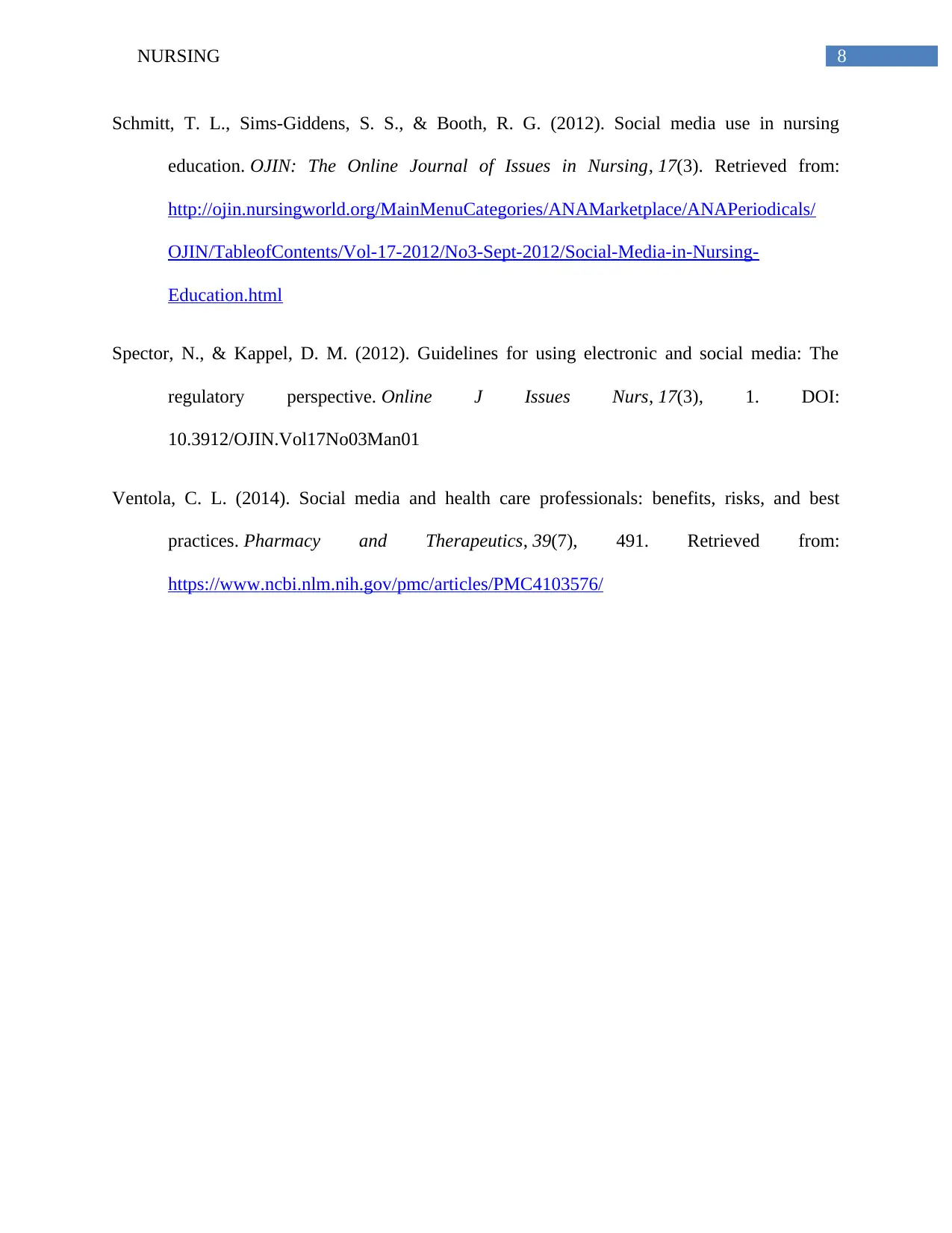
8NURSING
Schmitt, T. L., Sims-Giddens, S. S., & Booth, R. G. (2012). Social media use in nursing
education. OJIN: The Online Journal of Issues in Nursing, 17(3). Retrieved from:
http://ojin.nursingworld.org/MainMenuCategories/ANAMarketplace/ANAPeriodicals/
OJIN/TableofContents/Vol-17-2012/No3-Sept-2012/Social-Media-in-Nursing-
Education.html
Spector, N., & Kappel, D. M. (2012). Guidelines for using electronic and social media: The
regulatory perspective. Online J Issues Nurs, 17(3), 1. DOI:
10.3912/OJIN.Vol17No03Man01
Ventola, C. L. (2014). Social media and health care professionals: benefits, risks, and best
practices. Pharmacy and Therapeutics, 39(7), 491. Retrieved from:
https://www.ncbi.nlm.nih.gov/pmc/articles/PMC4103576/
Schmitt, T. L., Sims-Giddens, S. S., & Booth, R. G. (2012). Social media use in nursing
education. OJIN: The Online Journal of Issues in Nursing, 17(3). Retrieved from:
http://ojin.nursingworld.org/MainMenuCategories/ANAMarketplace/ANAPeriodicals/
OJIN/TableofContents/Vol-17-2012/No3-Sept-2012/Social-Media-in-Nursing-
Education.html
Spector, N., & Kappel, D. M. (2012). Guidelines for using electronic and social media: The
regulatory perspective. Online J Issues Nurs, 17(3), 1. DOI:
10.3912/OJIN.Vol17No03Man01
Ventola, C. L. (2014). Social media and health care professionals: benefits, risks, and best
practices. Pharmacy and Therapeutics, 39(7), 491. Retrieved from:
https://www.ncbi.nlm.nih.gov/pmc/articles/PMC4103576/
⊘ This is a preview!⊘
Do you want full access?
Subscribe today to unlock all pages.

Trusted by 1+ million students worldwide
1 out of 9
Related Documents
Your All-in-One AI-Powered Toolkit for Academic Success.
+13062052269
info@desklib.com
Available 24*7 on WhatsApp / Email
![[object Object]](/_next/static/media/star-bottom.7253800d.svg)
Unlock your academic potential
Copyright © 2020–2026 A2Z Services. All Rights Reserved. Developed and managed by ZUCOL.





